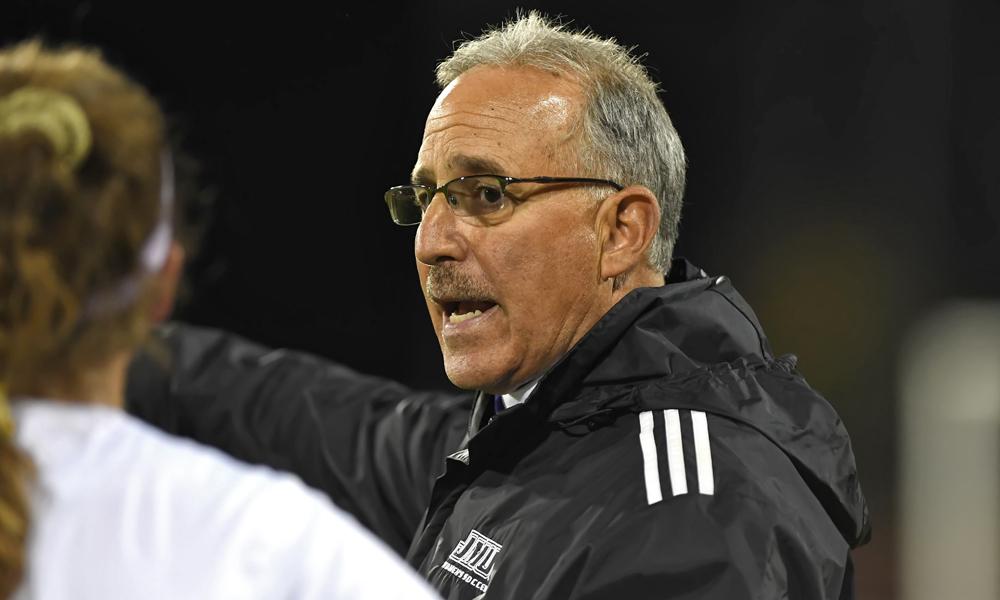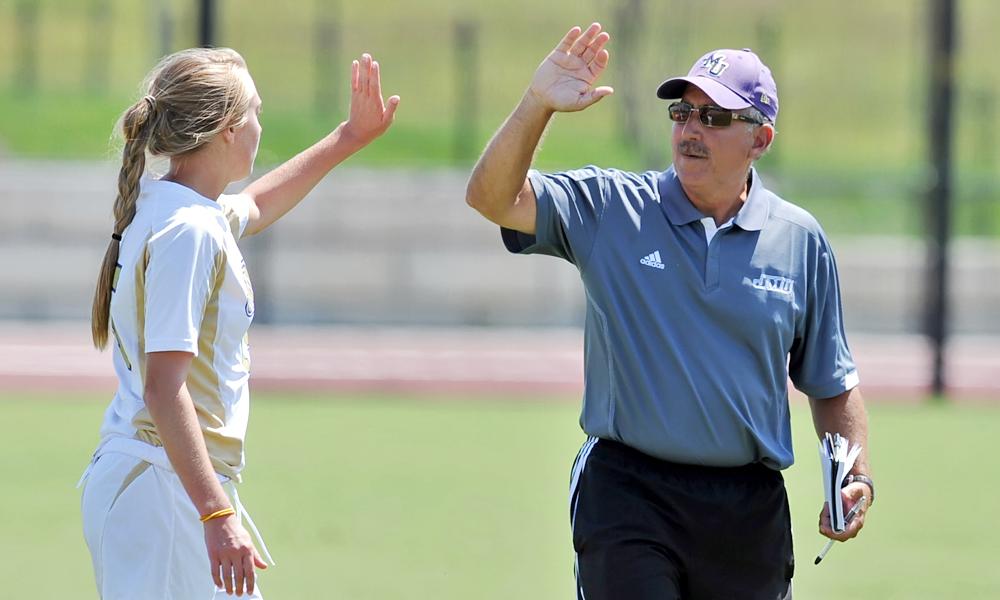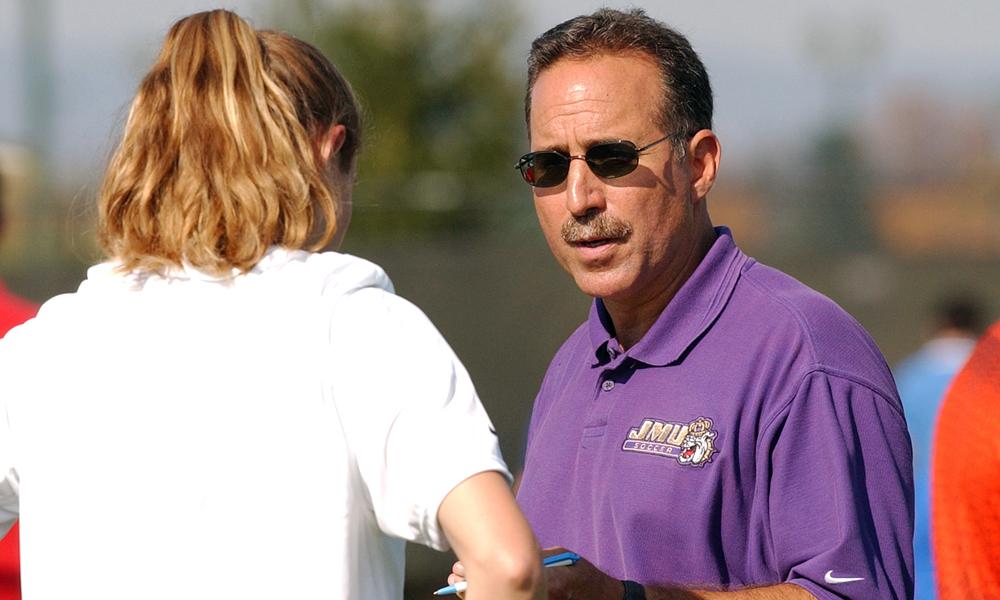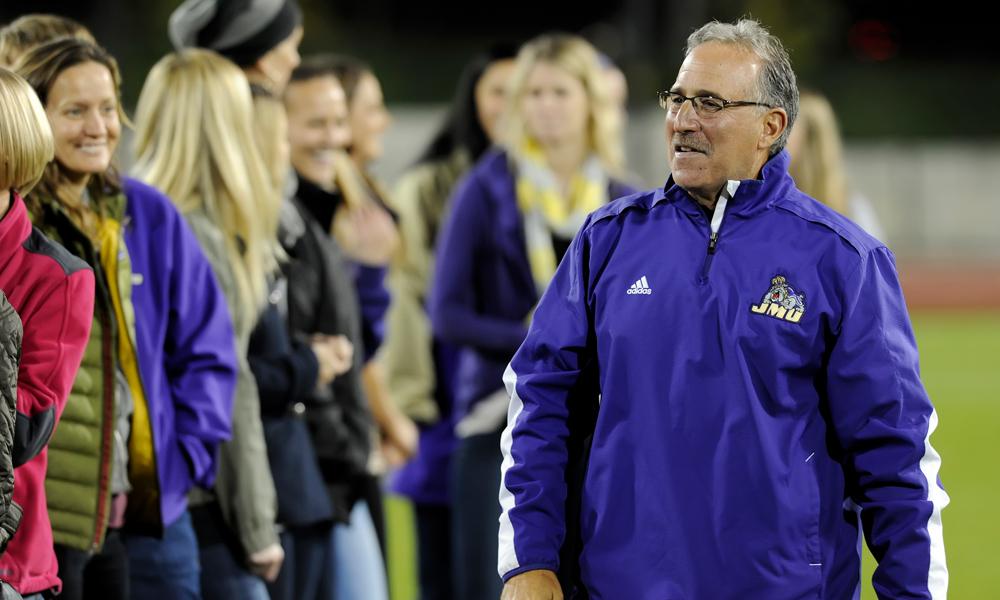Passing the torch
'Father' of JMU women's soccer hangs up his cleats after 28 seasons
News
SUMMARY: Former players celebrate the career of Dave Lombardo, who made JMU into an elite program and left a lasting impact on generations of young women.
from the Spring-Summer 2018 issue of Madison
By Kevin Warner (’02)
Dave Lombardo wore many hats in his 28-year run as James Madison women’s soccer head coach—recruiter, scheduler, practice planner, supervisor, skill developer, tactician. But ask the alumnae of his program and they’ll agree, he never shed his two most important hats—father figure and mentor.
“He wasn’t just a soccer coach, but he was a dad to each and every one of us,” said Annie Lowry Young ('08), an All-American who played for Lombardo from 2004-07. “He was our protector. He was someone who got us out of trouble, who guided us down the right path. He was pretty much everything rolled into one.”
During the recruiting process, Young originally had her sights set on Penn State. However, before making her decision, her father learned of JMU’s academic reputation and encouraged her to visit. “I met with Coach Lombardo and immediately Penn State went out the window,” Young said. “It was love at first sight with the campus and Dave’s personality and demeanor. You could feel his heart pounding through his chest and his love for the school and for his team. It sold me right then and there.”
 |
|
'He wasn’t just a soccer coach, but he was a dad to each and every one of us.' — Annie Lowry Young, All-American, 2004-07 |
Lombardo's love for the program was abundantly clear on Nov. 29, 2017, when he announced his retirement. The news prompted hundreds of congratulatory texts, emails and Facebook messages from former student-athletes, assistant coaches and colleagues.
Previously director of admissions and part-time soccer coach at Keene State College in New Hampshire, Lombardo called it a “leap of faith” to leave a job in which he found himself drawing up soccer plays on napkins during administrative meetings. Eventually the president decided that the admissions director shouldn’t be splitting his time coaching soccer.
“My wife and I sat down one day and Joan said, ‘What do you want to do?’ I said, ‘I think I want to coach,’” Lombardo said. “So we took that leap of faith and came down here with the intention of getting it started and later returning to our home in New England. But when I got down here to JMU, I really felt like I struck a home.”
Lombardo applied for the JMU opening late in 1989. His hire didn’t become official until mid-spring, leaving little time to recruit and prepare for the fall season. Using primarily JMU club players and other non-varsity student-athletes, Lombardo led the Dukes to a top-10 regional ranking in 1990. The following year, JMU found itself in the nation’s Top 25 polls.
Thanks to a natural resource of soccer talent in the state of Virginia, JMU women’s soccer quickly rubbed elbows with the elite programs in the area. Lombardo said, “I knew we’d be good pretty quickly. There were staffing and resource challenges early on, but eventually we started adding different things and became a consistent force and a giant killer. I travel all over the country, and we are by far one of the top programs on the East Coast in terms of facilities and everything else that JMU offers.”
|
'Coach treated every player with respect and kindness and genuinely wanted to fuel our passion for the game.' — Rachel Chupein Mullaney, former Dukes player and coach |
In the early years, Lombardo had only one graduate assistant coach. “Dave had a lot to have to teach me when I came down to be his assistant, especially in the office,” said Alison Foley ('94M), now the head coach at Boston College. “But he has helped me realize the importance of balance, family and to never take yourself too seriously. I have never laughed so much as I did when I was on Dave’s staff. The beauty is that our relationship hasn’t changed after all these years, and we still make fun of each other and laugh like it’s 1993!”
Lombardo quickly rooted his program in developing the person first and the player second. That investment in his student-athletes as young women preparing for life, in turn, yielded a team that fully bought into his system, and the results showed on the field.
“Coach treated every player with respect and kindness and genuinely wanted to fuel our passion for the game,” said Rachel Chupein Mullaney ('09), who played for, and later coached under, Lombardo. “He also made it clear to us that you can’t take a single game for granted. The highs can’t get too high and the lows can’t get too low.”
 |
Equipped with that mentality, the wins kept coming for Lombardo’s Dukes. They made their first of five consecutive NCAA appearances in 1995 and had 11 appearances altogether on his watch. JMU captured Colonial Athletic Association titles in 1995, 2002, 2010 and 2015, and six of his student-athletes were honored as All-Americans. At the time of his retirement, Lombardo ranked 12th all-time in victories (415) among women’s soccer head coaches, also good for sixth among active coaches.
One of Lombardo’s keys to victory was a team-first attitude and a consistent approach.
“Our biggest emphasis was about being a team and buying into the system with a style of play that was going to fit us,” he said. “We rarely game-planned for other teams. We basically had the arrogance to say, ‘This is what we do and if it’s not good enough, so be it, but you’re going to have to beat us.’ I think our kids enjoyed that approach and got revved up for it.”
The Dukes wore the “giant killer” label on multiple occasions over the years, perhaps most memorably in a loss at national power Portland in 2008. Playing in front of 5,000 fans against a third-ranked Pilots team that had allowed just six goals all season entering the contest, JMU All-American Teresa Rynier struck first, five minutes into the game. The Dukes later fell behind 3-1, but pulled within one on a goal by future professional Corky Julien with six minutes to go. They kept up the pressure for the remainder of the contest, which ended in a 3-2 defeat.
No other team—not Oregon, UCLA, USC, Florida, Penn State, Washington, Texas or Stanford—posted multiple goals against the Pilots all season. The Portland fans recognized what their juggernaut soccer team had just survived. “After the game,” Lombardo recalled, “a Portland faculty member came up to me and said, ‘I’ve been watching them for 20 years and I’ve never seen anybody do that to them.’”
 |
|
'I stayed in it because I love the relationships with the kids. That will be the hardest part, not having that.' — Dave Lombardo, women's soccer coach, 1990-2017 |
Looking back at the successes over the years, former players and coaches still say that their best memories are of Dave Lombardo the person, father and mentor.
“If you played for Dave or worked for Dave, you have an advocate and a friend for life,” Foley said. “Lots of players and assistants aren’t perfect, but he has always forgiven and been there for all of us. His loyalty to his extended family is something so unique and special to all of us.”
“I think he’s one of the greats,” Young said. “You don’t see someone begin a program, stick around for that many years and have every single class love you. It’s unbelievable to see the outpouring of love that has happened over the last few months. He’s a family member, not just our coach.”
Lombardo has handed over the keys to the women’s soccer program to new coach Joshua Walters Sr.—a hire he labeled one of the best in the country this offseason. But after 28 years, the transition from head coach to fan won’t be easy.
“I got into coaching soccer because I love soccer, but I stayed in it because I love the relationships with the kids. That will be the hardest part, not having that.”
